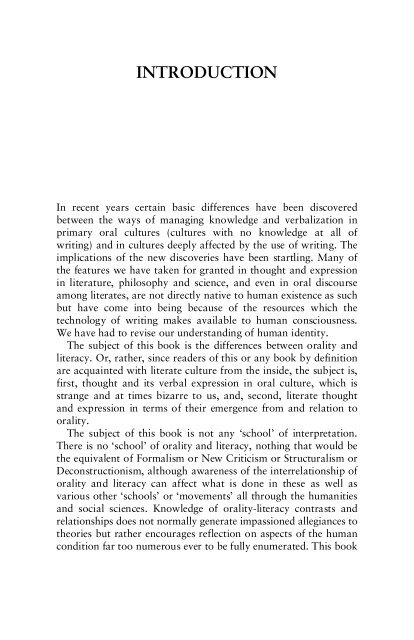Orality and Literacy: The Technologizing of the Word - Monoskop
Orality and Literacy: The Technologizing of the Word - Monoskop
Orality and Literacy: The Technologizing of the Word - Monoskop
Create successful ePaper yourself
Turn your PDF publications into a flip-book with our unique Google optimized e-Paper software.
INTRODUCTION<br />
In recent years certain basic differences have been discovered<br />
between <strong>the</strong> ways <strong>of</strong> managing knowledge <strong>and</strong> verbalization in<br />
primary oral cultures (cultures with no knowledge at all <strong>of</strong><br />
writing) <strong>and</strong> in cultures deeply affected by <strong>the</strong> use <strong>of</strong> writing. <strong>The</strong><br />
implications <strong>of</strong> <strong>the</strong> new discoveries have been startling. Many <strong>of</strong><br />
<strong>the</strong> features we have taken for granted in thought <strong>and</strong> expression<br />
in literature, philosophy <strong>and</strong> science, <strong>and</strong> even in oral discourse<br />
among literates, are not directly native to human existence as such<br />
but have come into being because <strong>of</strong> <strong>the</strong> resources which <strong>the</strong><br />
technology <strong>of</strong> writing makes available to human consciousness.<br />
We have had to revise our underst<strong>and</strong>ing <strong>of</strong> human identity.<br />
<strong>The</strong> subject <strong>of</strong> this book is <strong>the</strong> differences between orality <strong>and</strong><br />
literacy. Or, ra<strong>the</strong>r, since readers <strong>of</strong> this or any book by definition<br />
are acquainted with literate culture from <strong>the</strong> inside, <strong>the</strong> subject is,<br />
first, thought <strong>and</strong> its verbal expression in oral culture, which is<br />
strange <strong>and</strong> at times bizarre to us, <strong>and</strong>, second, literate thought<br />
<strong>and</strong> expression in terms <strong>of</strong> <strong>the</strong>ir emergence from <strong>and</strong> relation to<br />
orality.<br />
<strong>The</strong> subject <strong>of</strong> this book is not any ‘school’ <strong>of</strong> interpretation.<br />
<strong>The</strong>re is no ‘school’ <strong>of</strong> orality <strong>and</strong> literacy, nothing that would be<br />
<strong>the</strong> equivalent <strong>of</strong> Formalism or New Criticism or Structuralism or<br />
Deconstructionism, although awareness <strong>of</strong> <strong>the</strong> interrelationship <strong>of</strong><br />
orality <strong>and</strong> literacy can affect what is done in <strong>the</strong>se as well as<br />
various o<strong>the</strong>r ‘schools’ or ‘movements’ all through <strong>the</strong> humanities<br />
<strong>and</strong> social sciences. Knowledge <strong>of</strong> orality-literacy contrasts <strong>and</strong><br />
relationships does not normally generate impassioned allegiances to<br />
<strong>the</strong>ories but ra<strong>the</strong>r encourages reflection on aspects <strong>of</strong> <strong>the</strong> human<br />
condition far too numerous ever to be fully enumerated. This book

















